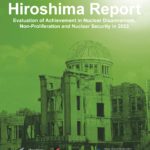Column 8 Nuclear Disarmament from a Youth Perspective: The Role of Japan and Hiroshima
by Satoshi Yanaizu
2020 marks the 75th anniversary of the dropping of the atomic bombings, a milestone for nuclear disarmament. Nevertheless, the situation surrounding nuclear weapons has never been more severe since the end of the Cold War. Nuclear armed states and other major powers have shown passive and retreating attitudes toward their commitment to the existing nuclear disarmament frameworks: the U.S. withdrew from the Intermediate-Range Nuclear Forces Treaty (INF Treaty), Iran’s Joint Comprehensive Plan of Action (JCPOA) was partially abrogated, negotiations between the United States and North Korea broke down, and Middle Eastern countries implied the possibility of developing their own nuclear weapons. Is it possible to turn back the tide once again? 2020 will no doubt be a crucial year.
Trust in bilateral and multilateral mechanisms that have underpinned nuclear disarmament, such as the New Strategic Arms Reduction Treaty (New START) and the Treaty on the Non-Proliferation of Nuclear Weapons (NPT), can broadly be defined as an international public good. It is sustained by each country’s compliance and support. As argued by Charles P. Kindleberger, when a hegemon initiates multilateral rulemaking, the international system stabilizes: indeed, nuclear disarmament in the post-Cold War era owes much to U.S. leadership. However, as the U.S. seems less willing to lead global cooperation in this increasingly multipolar world, it is vital for each country to share the burden in continuing to build trust towards existing nuclear disarmament frameworks without relying solely on the United States.
Japan must utilize its experience of being the only country suffering from the atomic bombings in wartime as a diplomatic resource and lead the way towards achieving a world without nuclear weapons. One of the issues which demand Japan’s agency is its approach towards the Treaty on the Prohibition of Nuclear Weapons (TPNW). The Government of Japan should recognize the value of the new approach that the TPNW represents, that is, emphasizing the inhumanity of nuclear weapons and trying to raise the political cost of possessing such weapons. Although reliance on the U.S. nuclear umbrella may keep Japan from ratifying the treaty for the time being, engagement is possible through such means as, for example, joining the Meeting of States Parties as an observer. There would be no conflict between this and the U.S.-Japan security system as well as the NPT. This would rather serve as an effective form of pressure to break through the stagnation that has beset the existing nuclear disarmament framework. In order for Japan to bridge the gap between stakeholders in this troubled time, its diplomacy requires the flexibility: Japan should work on a pragmatic approach towards the immediate security situation together with a farsighted strategy that looks to the total abolition of nuclear weapons as a long-term goal.
Drawing attention to the issue of nuclear weapons and demanding more accountability from our government will drive such diplomatic efforts. Here, the various measures that Hiroshima prefecture has been initiating can act as a starting point for further discussions. For example, the Hiroshima-ICAN Academy on Nuclear Weapons and Global Security 2019, which I took part in last summer, brought together 15 youths from 11 countries, including nuclear armed states. The participants had dialogues with hibakusha and experts to study four issues— “humanitarian consequences of nuclear weapons,” “nuclear weapons and global security,” “activities of civil society,” and “disarmament diplomacy and the role of the United Nations”—in order to explore forms of grassroots movements by each participant for their home country. On my part, I keenly realized my ignorance of the existence of Korean A-bomb survivors and the history of discrimination towards hibakusha. It provided me the opportunity to look beyond the superficial image of “a future-oriented Japan as the only country that has suffered from the dropping of the atomic bombs” and to feel the responsibility to continue studying in a humble manner the scars that the bomb left behind.
As the potential of the younger generation to move politics through their sense of urgency and action, such as in the field of climate change and other global issues, is in the spotlight, the efforts by Hiroshima Prefecture to work with youths nationwide and around the world through the Hiroshima-ICAN Academy will no doubt induce national debates on nuclear disarmament. I would like to fulfill my part by beginning with what I can do, such as launching symposiums in the United States.
Mr. Satoshi Yanaizu, Freshman, Harvard College





